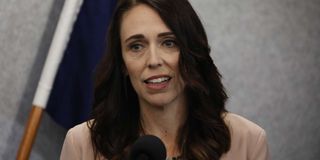New Zealand girls to get free sanitary pads

New Zealand Prime Minister Jacinda Ardern speaks during a press conference in last March. She has said the country will start providing free sanitary products for girls in schools. PHOTO | AFP
What you need to know:
- Prime Minister Jacinda Ardern said about 95,000 girls may miss school because they’re can't afford pads.
- Study shows 12 per cent of students in ages 12 to 18 reported difficulty accessing sanitary products.
- Last year, England announced it would provide free products to secondary school students.
- Scottish parliament in February approved plans to make sanitary products freely available to all women.
New Zealand government has announced it will start providing free sanitary products for girls in schools to tackle period poverty.
In a statement this week, Prime Minister Jacinda Ardern, said about 95,000 girls aged nine to 18 years may stay home during their periods because they’re unable to afford sanitary towels.
“By making them freely available, we support these young people to continue learning at school,” Ardern said.
The initiative will be first rolled out at 15 schools in the Waikato region – identified as those most in need – from term three of this year. The plan is to expand the program nationwide on an opt-in basis to all State schools by 2021, with the government investing $1.7 million (Sh180 million).
A survey from New Zealand-based Youth19 found 12 per cent of students in Year 9 to 13 (ages 12 to 18) who menstruate reported difficulty accessing sanitary products. What’s more, approximately one in 12 students reported skipping school because they couldn’t afford sanitary products.
Julie Anne Genter, the minister for women, said campaigners helped raise awareness of the issue, and that the cost of sanitary products could be "prohibitive" for some families.
"Menstruation is a fact of life for half the population and access to these products is a necessity, not a luxury," she said.
GLOBAL PANDEMIC
'We want an Aotearoa New Zealand where all people have access to education and the things they need to live a good life - I am so pleased this Government is finding ways of helping children and young people, at a time when every extra bit of assistance is important.
Ardern said the initiative is part of a wider effort to halve child poverty in New Zealand in ten years. While the plan had been more difficult by the global pandemic, it was important to "increase support in the areas it can make an immediate difference" to the lives of deprived girls around the country.
New Zealand isn’t the only country attempting to fight period poverty. Last year, England announced it would provide free products to secondary school students, while in February the Scottish parliament approved plans to make sanitary products freely available to all women, the first nation in the world to do so.
Locally, President Uhuru Kenyatta, in 2017, signed the Basic Education Amendment Act into law compelling the State to provide free, sufficient and quality sanitary pads to girls in public schools, especially low-income communities. This as a way of reducing the number of girls missing school during their menstrual cycle.
In sub-Saharan Africa, one in ten girls misses school during their period, according to a UN report in 2014. As a result, some girls reportedly lose 20 per cent of their education, making them more likely to totally drop out of school.




